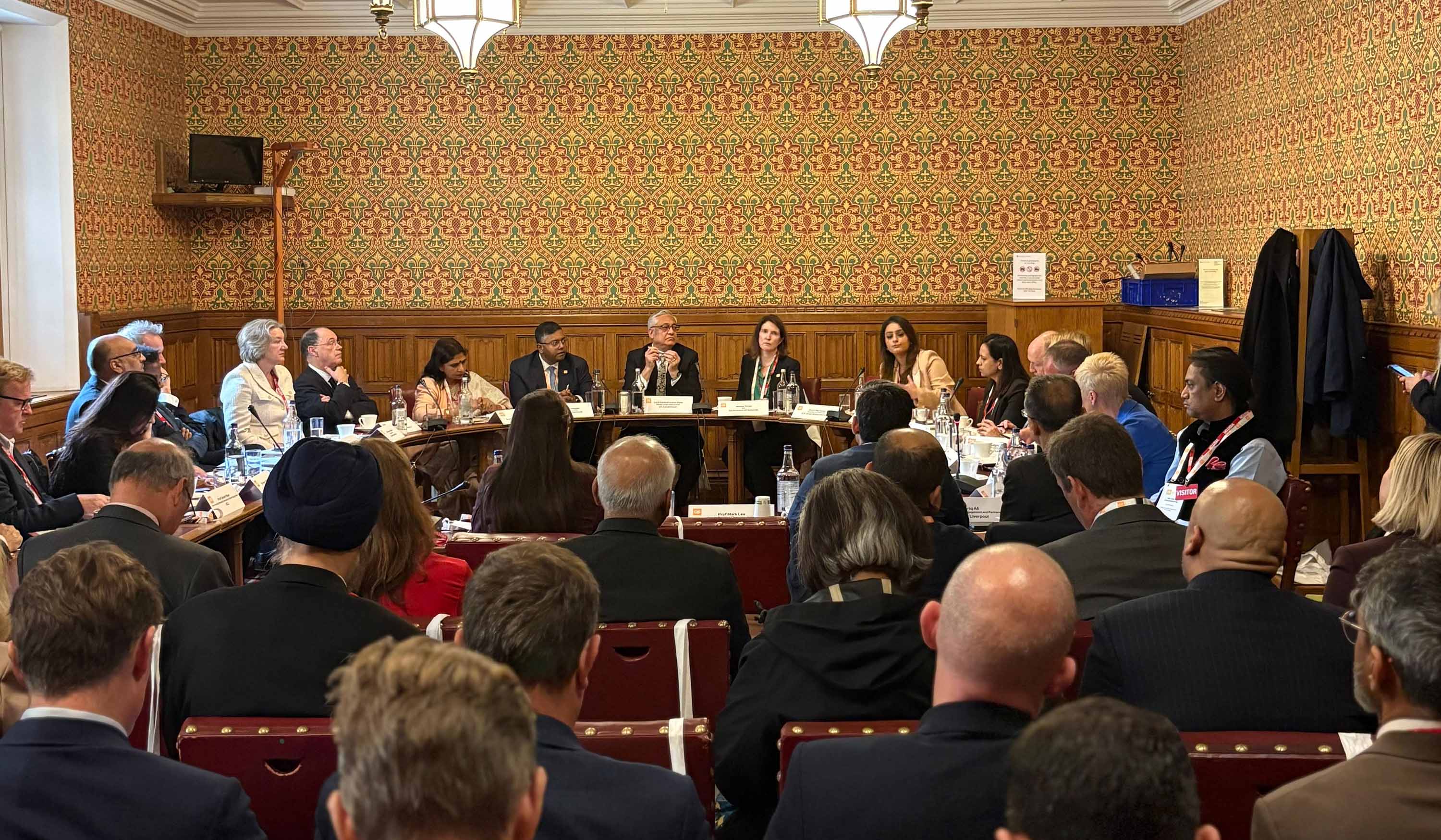Hungary demonstrates strong Academic Readiness, driven by high performance in AI and green disciplines. However, lower scores in Economic Transformation (54.1) and digital adoption (42.8) highlight a disconnect between education outcomes and industry demand. To remain competitive, Hungary must bridge this gap by strengthening university–business collaboration, expanding reskilling programmes, and investing in innovation-led growth.
Welcome to the Hungary Spotlight on the QS World Future Skills Index, where we explore higher education’s critical role in shaping the workforce of tomorrow. This tailored resource empowers you to analyse Hungary’s future skills supply and demand, benchmark key industry jobs and skills gaps against over 80 countries, and align your higher education system with the skills training required for economic transformation.
Hungary performance overview
Hungary sits mid-table in the QS World Future Skills Index, with notable strengths in Academic Readiness but clear room for improvement in Economic Transformation and workforce alignment. With a final score of 66.6, the country benefits from strong universities and a solid foundation in AI and green skills, but the transition from education to employment needs strengthening. To remain competitive in an evolving global economy, Hungary will need to bridge the gap between academic excellence and industry needs, particularly in digital skills and economic modernisation.
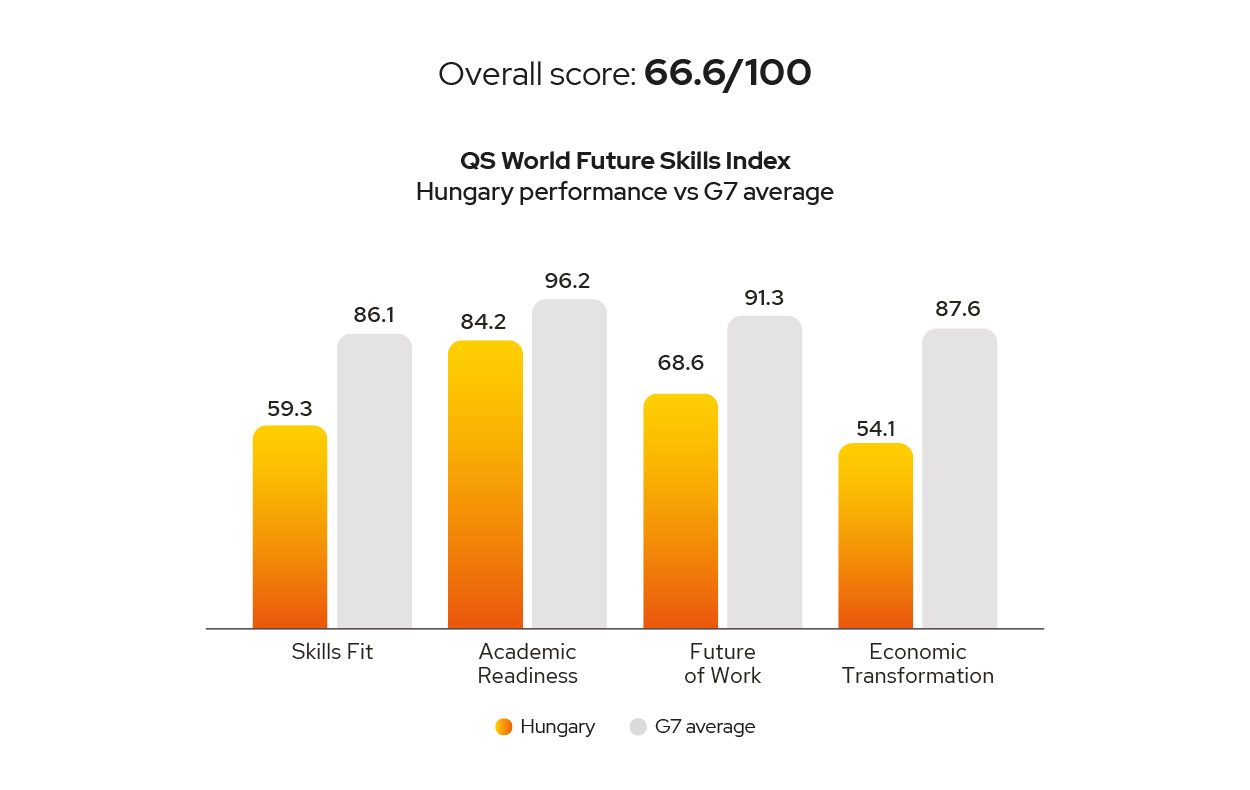
About the indicators
Skills Fit
The Skills Fit indicator measures how well countries are equipping graduates with the skills that employers desire. This is assessed by determining the gap between what employers find important and their level of satisfaction with the skills provided by graduates. This is done using data from the QS Global Employer Survey, the largest of its kind, and data from the World Bank Group. Since 2021, over 100,000 employers have rated the importance of certain skills and their satisfaction in their graduate hires.
Future of Work
The Future of Work indicator evaluates a country’s readiness to recruit for the skills needed in the jobs of tomorrow. Specifically, it measures how well the job market is prepared to meet the growing demand for digital, AI, and green skills, all of which are becoming critical as economies transition towards technology-driven and sustainable industries.
Academic Readiness
This dimension measures how well a country is prepared for the future of work. We look at the number of universities assessed for the QS World University Rankings by Subject, and how they perform. We then measure this in tandem with population size – if a country has a large population but few well-ranked institutions, for example, the country will be penalised.
Economic Transformation
Economic Transformation uses a weighted formula to assess a country’s readiness to support the growth and future of work and skills by examining various key indicators. The Index highlights whether a country has the infrastructure, investment power, and talent available to transition to industries driven by AI, digital transformation, green technologies, and high-skilled work, using data from the World Bank Group, UNESCO Institute for Statistics and the Education Policy Institute
Hungary performance in detail
Skills Fit
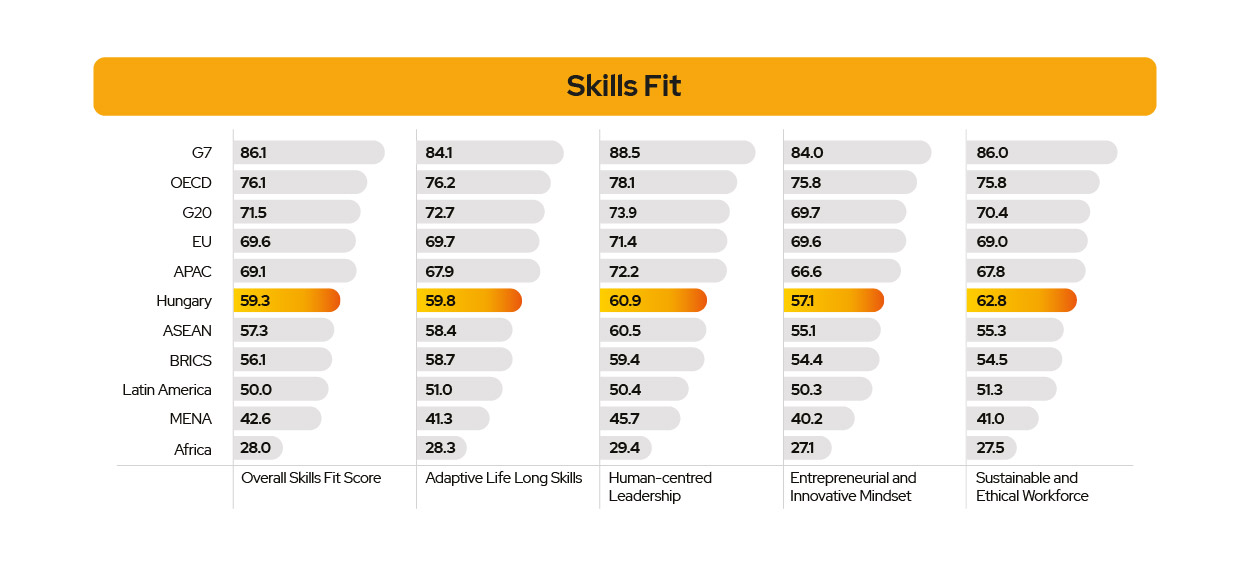
Hungary’s Skills Fit score of 59.3 suggests a reasonable but not strong alignment between education and workforce needs. The country performs fairly well in Human-Centred Leadership (60.9) and Sustainable & Ethical Workforce (62.8), reflecting growing attention to leadership and sustainability. However, Entrepreneurial and Innovative Mindset (57.1) is comparatively low, suggesting graduates lack problem-solving and initiative-taking skills valued by employers. The Adaptive Lifelong Learning score (59.8) indicates that while opportunities exist, they are not fully utilised. Expanding workplace training and strengthening university-business collaboration will help bridge these gaps.
Future of Work
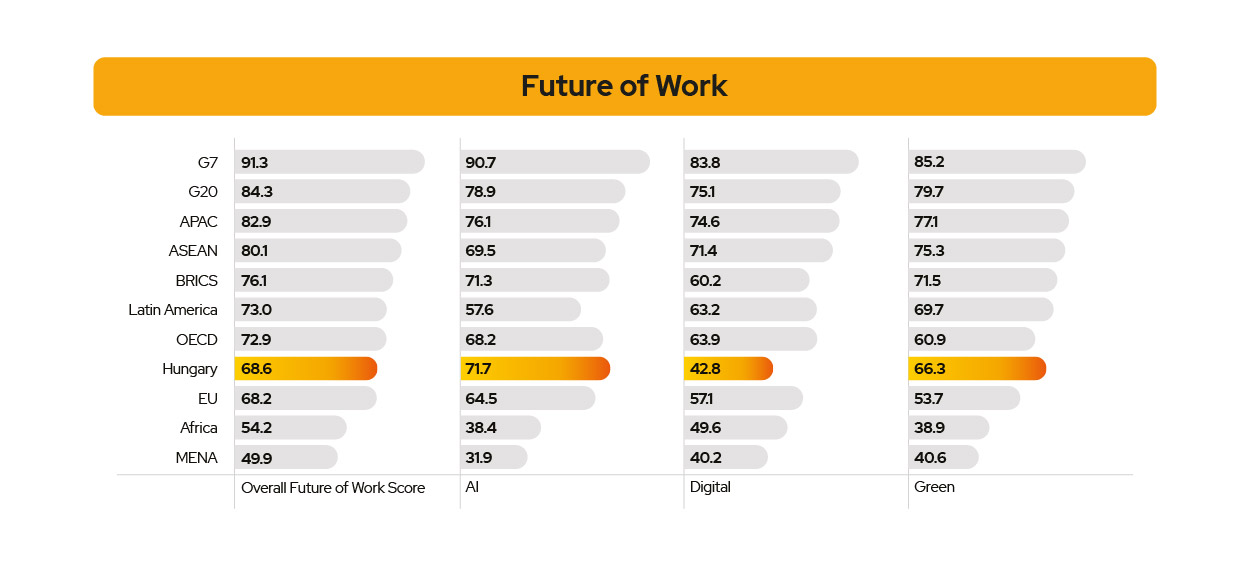
Hungary is reasonably well-prepared for the future of work, but there is a clear imbalance between AI (71.7) and Digital skills (42.8). While the AI sector is growing, digital adoption across industries lags behind, which could limit productivity and innovation. The Green score (66.3) indicates that Hungary is making progress in sustainability-related fields but still has work to do in fully embedding green skills across industries. Expanding digital literacy programmes, employer-led reskilling, and technology-focused training initiatives will be key to strengthening workforce adaptability.
Academic Readiness
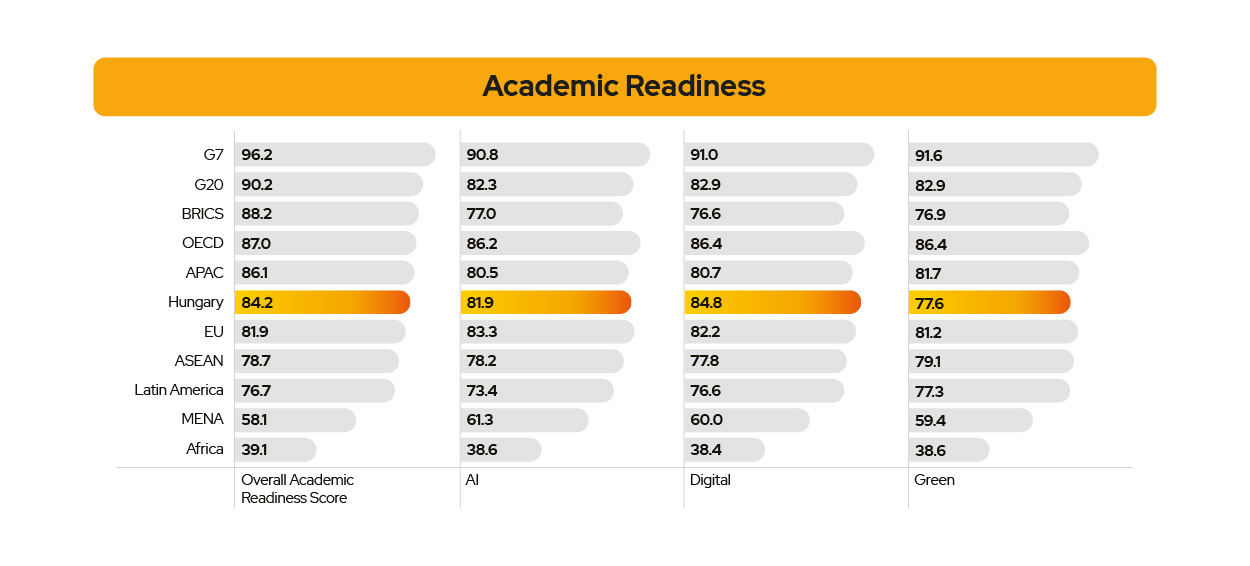
Hungary scores strongly in Academic Readiness (84.2), driven by high performance across the three sub-indicators. This suggests that Hungarian universities are successfully equipping students with the knowledge needed for future industries. However, the challenge lies in ensuring this translates into employability. Graduates with strong technical skills may still struggle to find opportunities within Hungary, highlighting the need for greater industry links, internships, and investment in high-value sectors.
Economic Transformation
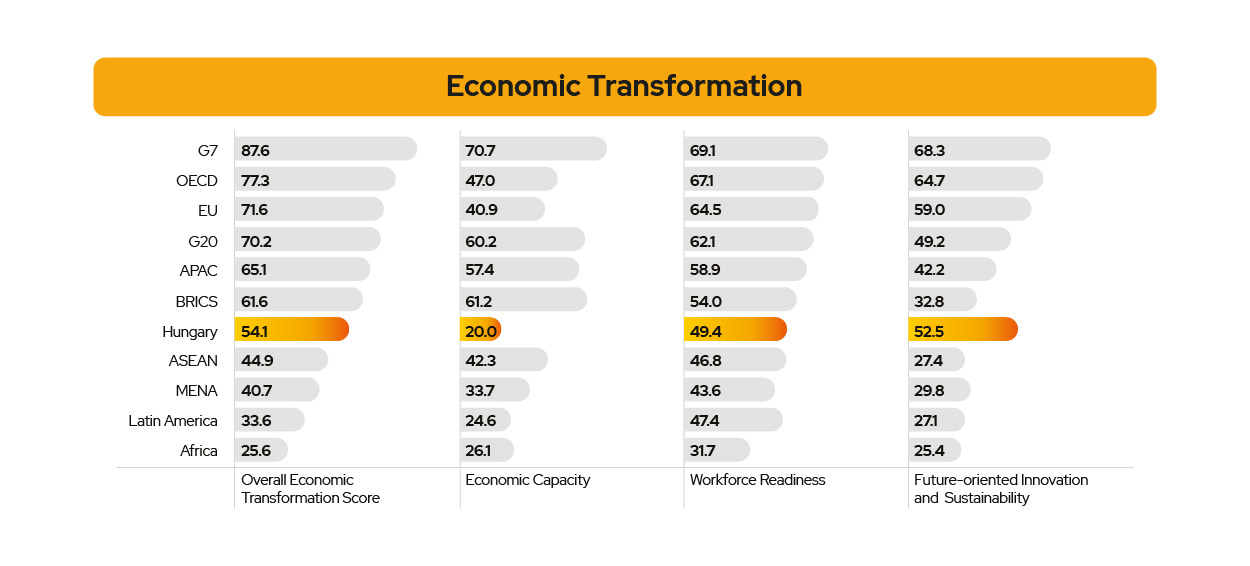
Hungary’s Economic Transformation score of 54.1 reveals significant challenges in modernising its economy. The Economic Capacity score (20.0) is particularly low, suggesting limited investment in R&D, business expansion, and infrastructure. Workforce Readiness (49.4) and Future-Oriented Innovation & Sustainability (52.5) scores indicate some progress, but a need for more investment in forward-looking industries. Strengthening entrepreneurship, incentivising investment in high-tech sectors, and improving access to funding for start-ups will be crucial for Hungary’s economic future.
Conclusion and analysis
Hungary, the world’s 53rd largest economy by nominal GDP, has a strong academic foundation, particularly in AI, digital, and green subjects, reflected in its high Academic Readiness score. The IMF forecasts 3.3% economic growth in 2025, a strong rebound following a short contraction in recent years. This is supported by the Hungarian government’s focused investment in capital formation and good inward-investment into the country.There is a clear demand for AI, digital, and green skills, but a gap remains between what graduates learn and what employers need. Hungarian employers are highlighting significant skills gaps across our four Skills Fit indicators, with performance below the EU average across the board. Without further investment in skills alignment, Hungary risks lagging behind in workforce readiness and innovation.
Our analysis and recommendations:
- Strengthen university-business collaboration – Closer ties between industry and universities will ensure graduates leave with in-demand skills, supporting both businesses and economic growth.
- Attract highly skilled international talent – Strategic policies could fill short-term skills gaps while the education system adjusts to evolving workforce needs.
- Expand lifelong learning opportunities – Investing in upskilling and reskilling programmes will help Hungary’s workforce remain competitive in AI, digital, and green industries.









.jpg)








